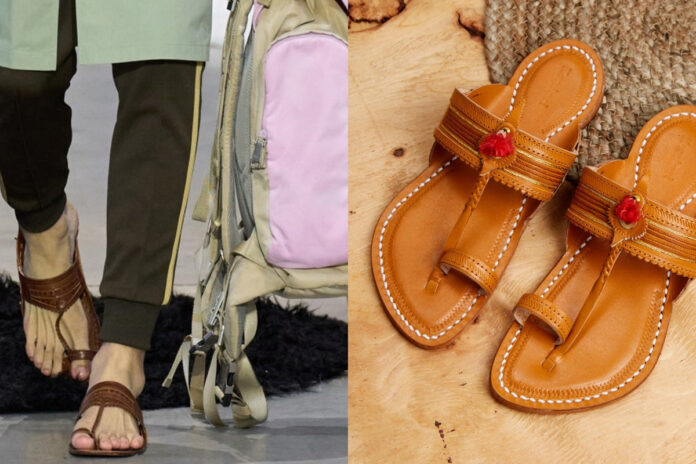Would you pay ₹1.2 lakhs for a pair of Kolhapuri chappals?
That’s exactly what Italian luxury brand Prada is doing — except they’re calling them “leather flat sandals” and offering no credit to the Indian artisans behind the design.
At its Spring/Summer 2026 showcase in Milan, Prada featured at least seven runway looks with sandals that closely resembled traditional Kolhapuris, complete with tan leather, thin straps, and toe rings. According to media reports, these sandals carry a price tag of roughly ₹1.16 lakhs.
Led by Miuccia Prada and Raf Simons, the brand even distributed leather “ring” tokens at the event, spotlighting the signature toe-loop design central to Kolhapuri footwear. Yet, nowhere did Prada acknowledge the heritage of this craft or the generations of Indian artisans who have kept it alive.
The move has sparked an intense debate on cultural appropriation in fashion — and how global luxury labels often adopt traditional designs without attributing or compensating the original creators.
The online backlash was swift and sharp.
“Prada is selling Kolhapuri chappals for ₹1.2 lakhs,” one user on X (formerly Twitter) pointed out. “These handcrafted chappals — a heritage of Maharashtra — sell for as low as ₹300–₹1,500 in Kolhapur. Prada slaps on a logo, rebrands them as ‘leather sandals,’ and erases their roots. This isn’t luxury — it’s theft.”
Another user added, “This design was taken from the Chamar community in India, who’ve handcrafted these for generations. No credit. No acknowledgment. Pure cultural theft dressed in a luxury label.”
A third voice stated, “@Prada, you’ve taken our Kolhapuri footwear but won’t even name it. We’ve poured generations of craft and heritage into these chappals. This is more than footwear — it’s our identity. Respect it, or stop stealing it.”
As the controversy intensifies, many are calling for global fashion houses to recognize the cultural significance of traditional designs — and to give due credit, and a fair share of profits, to the communities that created them.

